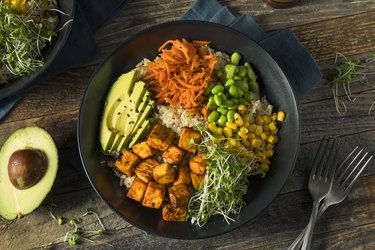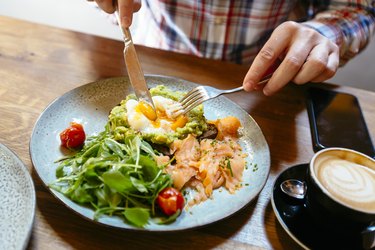
The focus of weight loss typically is to eat less, but what if you focused on eating more?
A major concern with the way we eat today is that we're filling up on a lot of foods that don't serve us well (i.e. fast-food, ultra-processed foods, foods high in sugar and saturated fats), and are falling short on the foods that not only provide us with the nutrition we need (fruits, veggies, whole grains, etc.) but that can actually help with weight loss, too.
Video of the Day
Video of the Day
If you're trying to lose weight (or just follow a more nutritious diet), here are three foods you should focus on getting in healthy amounts.
1. Whole Foods
Eating has become overly complicated. Take one look at the vast amount of food products on supermarket shelves and you'll get a sense of why. The number of packaged goods — often overly processed and covered in marketing and nutritional claims: sugar-free, fat-free, gluten-free, keto-approved, and the list goes on — inundate us.
About 70 percent of our food and beverage supply is now considered ultra-processed, according to a July 2019 study published in Nutrients. This is concerning because research to date shows that consistently eating these types of foods is doing a number on our waistlines.
Observational studies (which show an association, not cause and effect) have found a connection between the increasing popularity of ultra-processed foods and the obesity epidemic. Researchers of a review paper published in December 2019 in Current Treatment Options in Gastroenterology looked at the research and concluded that these foods are contributing to weight gain and decreased satiety (feelings of fullness).
A small clinical study (which shows cause and effect) published May 2019 in Cell Metabolism had similar findings. The researchers in this study broke subjects into two groups: an unprocessed-foods group and an ultra-processed-foods group. They found that despite subjects being allowed to eat as much or as little as they wanted, and meals being matched for calories and macros, the people in the unprocessed-food group naturally ate about 500 calories less each day.
So how do we eat more whole foods? Well, most foods, even some of the healthiest, are processed in some way — yogurt, oatmeal, chia seeds and so on. The issue here is ultra-processed foods — those that are high in sodium and saturated fat, have a lot of added sugars and/or have artificial additives like sweeteners and coloring.
Here are some tips on how to swap whole foods for ultra-processed foods:
- Choose plain, unsweetened or lightly sweetened yogurt (with less than 7 grams of added sugar) instead of yogurt with artificial sweeteners, coloring or higher amounts of added sugars.
- Aim to add whole fruits and/or vegetables to each meal. This will leave less room for more heavily processed foods.
- Opt for unsweetened iced tea or water with lemon over sugar-sweetened beverages like soda or other sweetened drinks.
- Make your own salad dressing at home combining oil, balsamic vinegar, spices and dried herbs versus shelf-stable store-bought dressings, which typically have a laundry list of ingredients.
- Batch cook old-fashioned oatmeal at the beginning of the week instead of relying on single-serve packets that might have added sugars and flavoring.
2. Fiber-Rich Foods
When we think of fiber, and eating more fiber, we typically think of how this nutrient helps keep us regular. But the truth is, the benefits of fiber go way beyond just digestion — aiding in weight loss is another boon.
Fiber is on the list of foods to eat to lose weight because fiber-filled foods are typically lower in calories and are nutrient-dense, like fruits and vegetables, making them weight-friendly. And when you're eating more fibrous foods, you have less room for nutrient-poor foods that might be working against your weight-loss goals. Because fiber slows digestion and swells in your stomach (specifically soluble fiber), you feel fuller longer.
Adding more fiber to your diet is one of the easiest things you can do when trying to lose weight — but the key is to try to get your fiber from whole plant-based foods first, versus more processed foods with added fiber — although these will ultimately help with boosting your fiber intake too.
And this is something most of us can benefit from. About 95 percent of Americans fail to get enough fiber on a daily basis, according to a January 2017 report from the American Journal of Lifestyle Medicine. A September 2014 USDA report reveals that, on average, we're eating 16 grams of fiber per day. The recommended intake is 25 grams per day for women and 38 for men. As the 2015-2020 Dietary Guidelines for Americans outline, this shortfall is largely due to our lack of fruit, vegetable and whole-grain consumption.
So how do you get more fiber in your diet? Eat more weight-loss friendly foods: whole grains (like brown rice, oatmeal and whole-wheat bread and pasta), fruit and especially vegetables like asparagus, turnips, broccoli, artichokes, green peas and Brussels sprouts.
3. Lean Protein

Getting adequate amounts of protein is crucial when trying to lose weight and for myriad reasons, as outlined in a June 2015 paper in the American Journal of Clinical Nutrition. First, protein is the most satiating nutrient (compared to carbohydrates and fat), and has been shown to help decrease overall calorie intake throughout the day.
Dietary protein is also a good food to eat to lose weight because it requires more energy to digest — 20 to 30 percent of its usable energy is used for metabolism and storage — compared to 5 to 10 percent for carbs and zero to 3 percent for fat. Getting adequate amounts of protein also helps your body hold onto lean muscle tissue, which is more metabolically active, keeping your metabolism up (and your body burning calories).
How much protein do you need? A December 2019 review paper published in Advances in Nutrition found that for most of us, the Recommended Daily Allowance of 0.8 grams per kilogram of body weight per day is sufficient. But if you're trying to lose weight or build muscle, you want to increase your intake to 1.3 grams per kilogram per day (keeping in mind that a kilogram equals 2.2 pounds). This shouldn't be too much of a stretch for most of us; we're currently eating 1.1 grams per kilogram, the study notes.
To put that into perspective: A 180-pound person who's trying to lose weight should get about 106 grams of protein a day.
If you're looking to up your protein intake, here are some of the best sources: eggs, salmon, white fish, chicken breast, tofu, farro, tempeh and beans.
- Nutrients: "The Healthfulness of the US Packaged Food and Beverage Supply: A Cross-Sectional Study"
- Current Treatment Options in Gastroenterology: "Beyond the Calories—Is the Problem in the Processing?"
- Cell Metabolism: "Ultra-Processed Diets Cause Excess Calorie Intake and Weight Gain: An Inpatient Randomized Controlled Trial of Ad Libitum Food Intake"
- American Journal of Lifestyle Medicine: "Closing America’s Fiber Intake Gap"
- USDA: "Fiber Intake in the U.S. Population"
- 2015-2020 Dietary Guidelines for Americans: "A Closer Look at Current Intakes and Recommended Shifts"
- American Journal of Clinical Nutrition: "The Role of Protein in Weight Loss and Maintenance"
- Advances in Nutrition: "Protein Intake Greater than the RDA Differentially Influences Whole-Body Lean Mass Responses to Purposeful Catabolic and Anabolic Stressors: A Systematic Review and Meta-analysis"